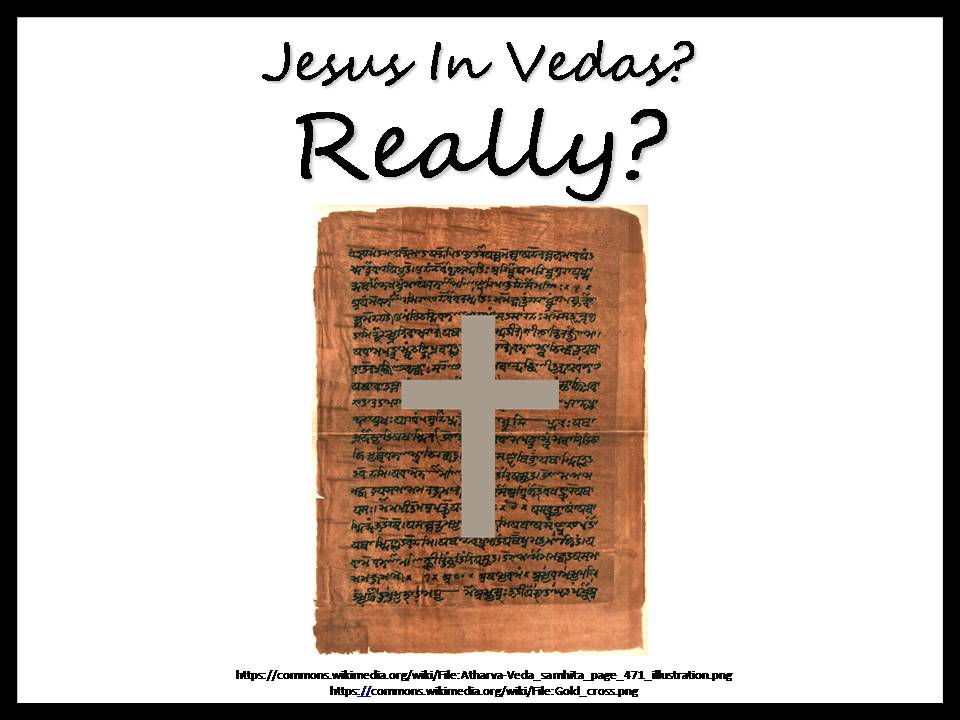 On 8th May 2016, the Gospel Truth Newspaper flaunted the conversion of Hindus in New Zealand.1 Apparently, the conversion was motivated by Acharya Vikas Massey’s speech that the Vedas (Sacred Scriptures of Hinduism) pronounces the Lord Jesus Christ as the one and the only way to heaven.
On 8th May 2016, the Gospel Truth Newspaper flaunted the conversion of Hindus in New Zealand.1 Apparently, the conversion was motivated by Acharya Vikas Massey’s speech that the Vedas (Sacred Scriptures of Hinduism) pronounces the Lord Jesus Christ as the one and the only way to heaven.
I was exposed to this rather stunning detail many years ago, and I was astonished when I first heard it. The Vedas (written much prior to Christ’s birth) prophesying Christ! Well, this is indeed a stunning piece of news, isn’t it?
If the instance of Hindus converting to Christianity because of Acharya Vikas Massey’s ministry was factual, then those who converted were probably awestruck by the Vedic endorsement of Christ. So what if the Vedas affirm Christ, why should anyone be awestruck?
The reason is rather evident and simple. If the sacred scriptures of Hinduism state that Christ is the only way to heaven, then, seemingly, Hinduism self-destructs. In other words, Hinduism would endorse Christianity as the true religion at the cost if its own credibility. This probably was the reason for the conversion of Hindus to Christianity in New Zealand.
However, Jesus in the Vedas is more fascinating than Jesus in the Quran. Why?
The Vedas apparently prophesied Christ. But the Quran, written much later than Christ’s death and resurrection, merely narrates the existence of Jesus.
Moreover, Jesus in the Quran contradicts with the Jesus of the Bible. The Quran considers Christ as a mere prophet, whereas Christ in the Bible is God incarnate. Hence, the information that the Quran mentions Christ is not as stunning as the news that the Vedas prophesies Christ.
When I was awestruck by the news that the Vedas affirm Christ, I did not venture into exploring the validity of such a claim. I considered my source as infallible and continued to believe that Christ was indeed mentioned in the Vedas.
Do the Vedas really prophesy the Christ of the Bible?
Two quick facts are in order. First, Christ is not explicitly mentioned as the only way to heaven in the Vedas. Second, the Vedas mention the deity, Prajapati, who, according to some Christians, is an allusion to the Lord Jesus Christ.
The Christ of the Bible is not prophesied in the Vedas.
Consider the attributes of the Lord Jesus Christ from the perspective of Historic Christianity. The Bible that reveals Christ in all HIS fullness informs us that Christ is the second person of the blessed Godhead. Christ is God incarnate (God in the form of man), the savior of the world. In other words, Christ is not one of the many gods, but God HIMSELF.
Consider the attributes of Prajapati from the Vedas.
Apparently, the 10th mandalam of the Rig Veda mentions “Prajapathy” as the son of God, “Prajapathy, the son of the God comes to this world at the appropriate time. After coming to this world he travels around advising mankind, what is sin and what is not sin; what is to be done and what is not to be done; what is wrong and what is right. To those human beings, who accept his advises and obey his orders, he offers prosperity and peace in this worldly life and salvation at the time of their death. And being the completion of his venture to redeem mankind from sin, he gets sacrificed at the end his specified period on earth.”2
According to the Vedas, Prajapati presides over life and procreation.3 But Prajapati is not the only deity mentioned in the Vedas. In addition to Prajapati, the Vedas speak about other deities as well.
So the Prajapati is one of the many deities stated in the Vedas. Whereas, according to the Bible, Christ is God, not one among the many gods. The Bible does not mention the existence of Gods. The Bible specifies one God – God in three persons, the Father, the Son and the Holy Spirit – the blessed Trinity. This fundamental difference is sufficient to disregard the claim that Christ was prophesied in the Vedas.
The Prajapati of the Vedas and the Christ of the Bible contradict each other. Studies have exposed the dissimilarities between the Prajapati and the Christ of the Bible. The website of World Revival Prayer Fellowship offers information to this theme.4
It is evident that the Vedas do not prophesy the Christ of the Bible. Therefore, just as how we, the Christians subscribing to Historic Christianity, disregard the Jesus of the Quran, we should also ignore and disregard the claim of Jesus in the Vedas.
Endnotes:
2 http://www.haindavakeralam.com/christian-missionary-frauds-hk9554
3 https://en.wikipedia.org/wiki/Prajapati#Prajapati_in_Vedas
4 http://www.wrpf.org/balan.html
Websites cited were last accessed on May, 16, 2016.
This article was originally published at http://rajkumarrichard.blogspot.in/2016/05/jesus-in-vedas.html
